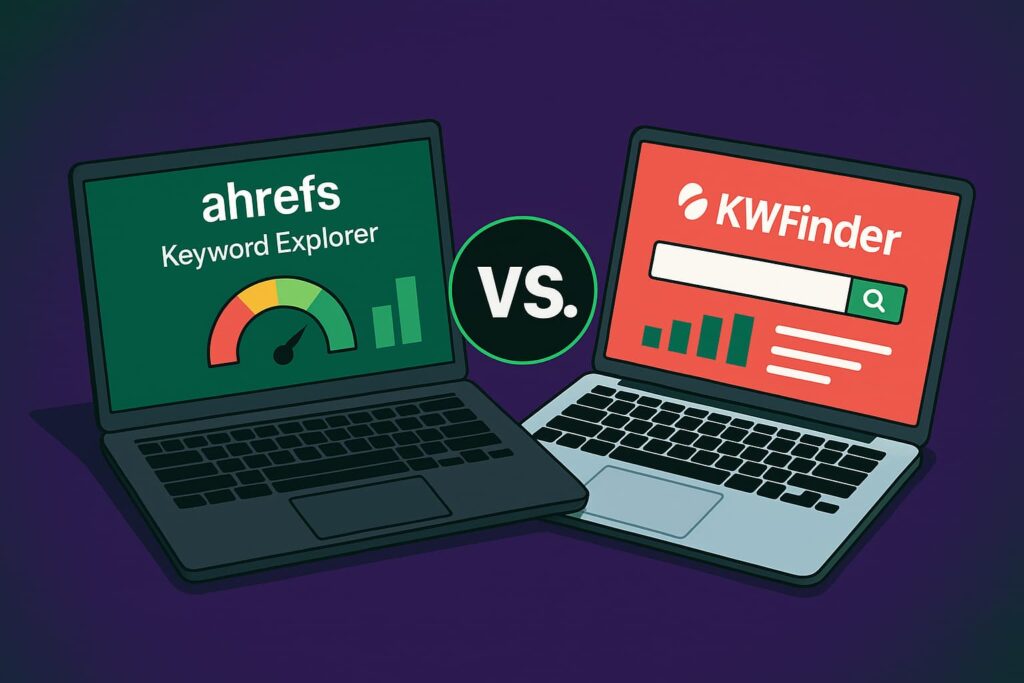Torn between Ahrefs Keyword Explorer vs KWFinder? This guide may be the answer you need.
Keyword research sits at the heart of every successful SEO strategy. It helps you understand what your audience is searching for, how competitive those searches are, and where the best opportunities lie.
Recent survey rollups show that about 3 in 5 marketersconsider inbound methods like SEO and blogging their best source of quality leads.
Two tools consistently appear at the top of any SEO stack: Ahrefs Keyword Explorer and KWFinder. Both help you uncover profitable keywords, analyze competition, and plan content strategies. But which one is better suited for your goals and budget?
Let’s break down how each performs in real-world SEO workflows.
Ahrefs Keyword Explorer
Ahrefs Keyword Explorer is part of the larger Ahrefs ecosystem. It is a comprehensive SEO platform built for professionals and agencies. It’s designed to provide deep insights into search behavior, competition, and traffic potential.
Many digital marketers, from freelancers to established SEO agencies in Sacramento,use Ahrefs to refine keyword strategies and strengthen local SEO campaigns.
Ahrefs sources its keyword data from clickstream data and multiple search engines, allowing users to see not just how many people search a term, but also how many actually click on search results. This makes its metrics more actionable than simple search volumes.
It’s ideal for businesses running large-scale content or link-building campaigns that rely on accuracy and competitive intelligence.
Features
- Keyword Difficulty (KD):Estimates ranking difficulty based on backlink profiles.
- Clicks and Clicks per Search:Reveals how often users actually click a result after searching.
- Traffic Potential:Predicts the total traffic a top-ranking page could earn.
- SERP Overview:Displays current top-ranking pages, backlinks, and domain ratings.
- Parent Topic and Related Keywords:Helps cluster keyword ideas and discover broader topics.
- Bulk Analysis & Lists:Manage, group, and export thousands of keywords easily.
The integration with Ahrefs’ Site Explorer, Rank Tracker, and Content Explorer makes it a powerhouse for full-funnel SEO analysis.
Pros
- Huge database of billions of keywords.
- Highly useful click metrics beyond raw volume.
- Excellent for competitor research and gap analysis.
- Detailed SERP and backlink data integrated in one platform.
Cons
- Steeper learning curve for new users.
- Higher monthly pricing for smaller teams.
- No true free plan; limited trial access.
Pricing
As of 2025, Ahrefs starts at $99/monthfor the Lite plan and scales up to $999/monthfor Enterprise. Each tier increases limits for reports, users, and tracked projects. While costly, the ROI can be substantial for those managing multiple sites or data-heavy campaigns.
What Users Say
On major review sites, users consistently praise Ahrefs’ accuracy, keyword insights, and competitive analysis tools. Some note that its dense interface can feel intimidating at first, but once mastered, it becomes an indispensable SEO ally.
Related: Ahrefs vs Majestic vs SEMrush vs Moz: Features, Pricing & Which to Choose for Beginners
KWFinder
KWFinder, developed by Mangools, is a lightweight and user-friendly keyword research tool focused on simplicity and affordability. It caters to freelancers, bloggers, and small businesses looking for actionable insights without the complexity of enterprise tools.
While smaller in scale than Ahrefs, KWFinder’s strength lies in its visually intuitive interface and smooth keyword discovery process. It makes keyword research approachable, even for beginners.
Features
- Keyword Difficulty (KD):Estimates competition using backlink and authority signals.
- Local SEO Targeting:City- or region-specific keyword searches.
- SERP Analysis:Real-time top results for each query.
- Competitor Keyword Lookup:Find keywords a specific domain ranks for.
- Trend Graphs:Visualize keyword popularity over time.
- Integration with Mangools Suite:SERPChecker, LinkMiner, and SiteProfiler.
These features make KWFinder a complete yet simple toolkit for small-scale SEO projects.
Pros
- Clean, visual, and intuitive interface.
- Affordable pricing for individuals and small businesses.
- Ideal for local and niche keyword research.
- Easy keyword grouping and filtering.
Cons
- Smaller keyword database than Ahrefs.
- Lacks advanced click metrics and deep backlink telemetry.
- More limited export capacity for large-scale campaigns.
Pricing
KWFinder’s plans start at $29.90/monthfor the Basic plan, going up to $89.90/monthfor Agency. All plans include access to the full Mangools suite, making it a strong all-in-one value for those managing smaller sites or budgets.
What Users Say
Local SEO agenciesfrequently praise KWFinder’s ease of use, clean design, and reliable KD scoring. Some note that its dataset is smaller than competitors, but many appreciate that it delivers just what most small businesses need without the bloat.
Data Accuracy & Keyword Metrics
One of the biggest differences between Ahrefs and KWFinder is data accuracy.
- Ahrefsgathers information from clickstream data, multiple search engines, and frequent SERP updates. It measures not only search volume but also click behavior, which helps you prioritize keywords that bring actual traffic.
- KWFinderrelies more heavily on Google’s API and returns a straightforward snapshot of volume and difficulty. This is great for quick validation, but with fewer variations and less click context than Ahrefs.
Keyword Difficulty (KD) in both tools estimates how hard it is to rank for a keyword based on backlink strength and authority signals. Independent analyses reinforce why KD matters: the #1 Google result tends to have 3.8× more backlinksthan positions #2–#10.
Verdict:Ahrefs delivers more precise and scalable keyword data for professional SEOs, while KWFinder offers a simpler, reliable snapshot for everyday research.
Feature Comparison
| Feature | Ahrefs Keyword Explorer | KWFinder |
| Keyword Suggestions | Massive, global database | Smaller but focused suggestions |
| Volume Trends | Historical data + click metrics | Clear, visual trend graphs |
| SERP Analysis | Real-time + historical views | Real-time only |
| Click Metrics | “Clicks” & “Clicks per Search” | Not available |
| Competitor Research | Deep integration via Site Explorer | Lighter via SERPChecker |
| Export/Filtering | Advanced bulk export & filters | Basic export & grouping |
Verdict:Ahrefs is built for depth and scale; KWFinder emphasizes speed and simplicity.
Which One Should You Choose?
Your choice depends on who you are and what you need.
- Freelancers/Small Businesses:Choose KWFinder. It’s affordable, intuitive, and provides everything you need to plan basic keyword strategies.
- Agencies/SEO Professionals:Go for Ahrefs. Its data depth, competitive research, and backlink metrics make it a must-have for advanced campaigns.
If you’re working with a Sacramento SEO agencyor investing in professional SEO serviceslike Sierra Exclusive, Ahrefs offers more robust tools for competitive analysis and multi-client projects.
The trade-off is clear: KWFinder offers simplicity and value, while Ahrefs provides power and precision.
If you manage multiple clients or run content campaigns that rely heavily on backlink data and traffic potential, Ahrefs is worth the investment. But if you just need accurate, easy-to-understand keyword ideas, KWFinder will do the job brilliantly.
Conclusion
Both Ahrefs Keyword Explorer and KWFinder are excellent keyword research tools, just built for different audiences.
Ahrefs is the data giant: powerful, deep, and perfect for scaling SEO operations. KWFinder is the minimalist: simple, visual, and cost-effective for smaller setups.
The best approach? Try both. Run a week’s worth of keyword research through each tool and see which aligns better with your workflow and goals. In SEO, the “best” tool isn’t just the most powerful. It’s the one you’ll actually use consistently.
Frequently Asked Questions
Which tool offers more accurate keyword difficulty metrics, Ahrefs or KWFinder?
Ahrefs generally offers more accurate keyword difficulty (KD) metrics because it calculates difficulty based on real backlink data and clickstream insights. KWFinder’s KD is solid but relies more on Moz metrics and smaller datasets. For precision at scale, Ahrefs leads.
Is KWFinder good enough for freelancers and small businesses?
Yes. KWFinder is perfect for freelancers and small businesses thanks to its simple interface, affordable pricing, and clear keyword insights. It covers all essentials without the learning curve of enterprise tools.
Can KWFinder replace Ahrefs if my budget is limited?
For basic keyword research and local SEO, KWFinder can serve as a solid Ahrefs alternative. However, it lacks advanced backlink analysis and in-depth SERP data. Use it as a budget-friendly starting point, then scale to Ahrefs when ready.
How do the keyword databases of Ahrefs and KWFinder compare in size and scope?
Ahrefs maintains one of the largest keyword databases globally, covering billions of search terms across multiple search engines. KWFinder’s database is smaller and focused mainly on Google data. The difference is most noticeable for long-tail and international keywords.
Which tool provides better click-metric data (e.g., clicks per search)?
Only Ahrefs offers click-metric data such as “Clicks” and “Clicks per Search.” KWFinder doesn’t include this level of engagement insight. That makes Ahrefs more useful for measuring actual traffic potential.
Are there scenarios where using both tools makes sense?
Yes. Many marketers use Ahrefs for deep data and KWFinder for quick keyword checks or client-friendly visuals. Combining them balances accuracy, speed, and affordability.
Which tool is easier to use for beginners in keyword research?
KWFinder is more beginner-friendly thanks to its clean design and straightforward metrics. Ahrefs can feel overwhelming initially but becomes powerful once you understand its features. Beginners often start with KWFinder and transition to Ahrefs as their SEO needs grow.

